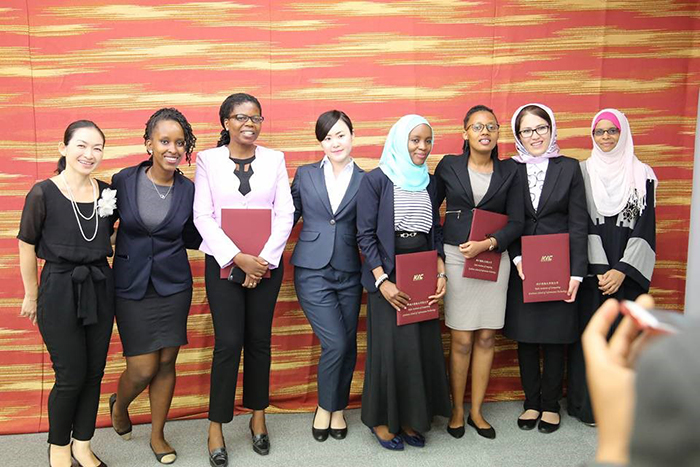To pay a tribute to kind and hardworking spirit of Ms. Bahar, her family members found Najiba Bahar Foundation in Nili, the capital of Daikundi province.
Faiza Salehi, 18-year-old high school student in remote Daikundi province of Afghanistan, was thirsty of reading books. She longed to read novels, short stories and other books more than textbooks. In July 2019, Faiza was relieved as she saw a library being inaugurated in her hometown: Najiba Bahar Library. The library was packed with novels, biographies, children fairy tales, encyclopedia, and many more books. Faiza Salehi visits the library every day during summer school break, where she can easily read top thinkers, leaders, and authors of the world.
“Reading benefits me a lot,” said Faiza. “It helps me think independently and understand the world.”

Behind the library, which marks a milestone in Faiza’s student life, however, there is a tragic story. In July 2017, a Taliban-claimed suicide bombing killed Najiba Bahar in Kabul. To honor the memory of 27-year-old Najiba, her fiancé and family founded Najiba Memorial Foundation and Najiba Bahar Library.
“When Najiba was at school, she would do house chores first, and then walk one hour to reach her school classes. She was first position holder in school,” Zahra, the 46-year-old mother of Najiba, said with a deep sigh.
Najiba graduated from high school scoring 4 GPA. With a poor financial background, she came to the capital Kabul and qualified for an Indian funded scholarship. Najiba won a fully funded scholarship and took her first ever flight to India.
“Don’t take me for a feeble creature for I am a girl,” Najiba told her mother. “I have courage and I am sure I will develop a reputable persona for me.”
Following her graduation from college with a bachelor degree in computer science, Najiba secured a promising job at the Afghan Ministry of Mines and Petroleum.
Zahra would often visit her oldest daughter Najiba in Kabul and stay with her for days. She would urge her daughter not to go to office every time a suicide bombing was striking Kabul. In response to her mother’s concern, however, Najiba used to ask one simple question: “Do you want me to become a housewife in Daikundi?” “No way mother. I can’t go back,” she would say in response to her mother’s urge.
In 2014, Najiba grasped an opportunity to pursue her higher studies in computer science in Japan. She had a big dream for her country: building an electronic governance in the war-torn Afghanistan.
“She used to talk about her dreams,” said Zahra. “She wanted to receive a master degree, earn enough to build a house, purchase a car and get married with a good person, and then donate her money to poor people.”
Upon her arrival in Kabul, with a master degree in hand, she rejoined the ministry. On July 24, 2017, a car bomb targeted a minibus that was carrying Najiba and her colleagues.
Najiba’s life and dream were put to end by a Taliban-claimed bombing in Kabul. Days before, her fiancé Hussian Rezai and Najiba had set date for their marriage party.
“I rushed to scene of suicide bombing and searched the hospitals nearby,” said Husain Rezai, who first met her online, and developed a romantic relationship. “I found one of her hands in a hospital and we collected every piece of her body from different hospitals.”

The world went dark for Hussain, who was deeply in love with Najiba. Zahra could not believe her eyes when she saw the grave of her daughter. She would even hear Najiba’s voice on phone, her greeting, even after she was killed. “I wanted to get out of home and go to the mountains to scream loud and louder and the loudest,” said Zahra. “I lock myself in a room and cry when her memory attacks me.”
To pay a tribute to kind and hardworking spirit of Najiba, Hussain along with Najiba’s family decided to found Najiba Bahar Foundation in Nili, the capital of Daikundi province. Najiba Bahar Library is the first initiative that has been taken to commemorate her death. “The foundation helps me heal my anguish,” said Hussain. “We want to build future with name of Najiba.”
In July 2019, Zahra gathered personal belongings of Najiba and took it to Nili. With 7,000 books and 4,000 magazines, and a number of printed research papers, Hassan, too, reached to Nili to inaugurate the library, aiming to keep her memory alive and fight back terrorism by promoting culture of reading and tolerance.
“When I visit the library, it heals my heart,” said Zahra. “I want to stay days and nights in the library, close to my daughter.”
Javed Mohseni, 22-year-old, found himself stuck in home following his graduation from sociology department of Bamyan University in 2018. After the inauguration of Najiba Bahar Library, he visits the library every day, immersing himself in books mostly in social studies.
“It’s a valuable and rich library,” said Javed. “The existence of library in a rural and deprived area makes it special, as we do not have other library as rich as this one in our province.”




